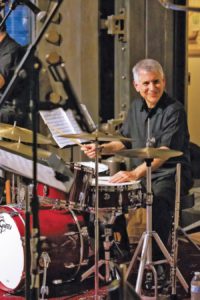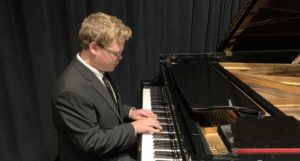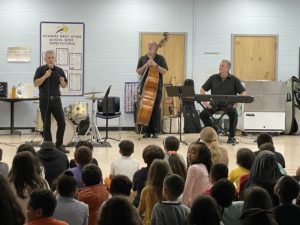When Bart Weisman arrived in Provincetown in 1980 to pick up the woman who would become his wife and take her home to Washington, D.C., where they both grew up, he knew someday he would live on the Cape. It was the same indescribable feeling he had had when he first saw someone playing a drumset.

“I knew that’s what I was going to do for the rest of my life,” he says.
Weisman and his wife, Amy Heller, moved to Provincetown in 2003 and lived there for nine years before settling in Orleans. In 2005, Weisman started the nonprofit Provincetown Jazz Festival.
Now, as the 15th season of the festival comes to a close, with the last performance on Aug. 16 at the Provincetown Art Association and Museum, Weisman reflects on the tapestry of jazz he has woven on the Outer Cape.
Before 2005, Weisman says, there wasn’t a successful jazz festival here. “The one thing I immediately did was start exploring,” he says. “I tried master classes, I tried day concerts, I tried night concerts.”
He began with a format that continues to this day: “We use local musicians to back professionals who normally don’t come to the Cape. That way, each year we can premiere new musicians.”
Big names who perform at the festival — like Molly Ringwald, Dane Vannater, and Rebecca Paris — ensure the high level of performance that festivalgoers have come to expect. “People come to the festival because they know the quality is going to be there every year,” says Weisman.
Celebrated musicians have been willing to make the trip here, says Weisman, even though the audiences usually aren’t huge. It’s part of the culture of jazz performance, he says.

“Whether you’re playing for 50 people or 10,000, it really doesn’t matter,” says Weisman. “You’re still going to give a great performance. It’s the same for me. If it’s 50 people or 400, I’m going to be the best Bart I can be.”
One of the keys to great performances, Weisman says, is that “with jazz, you play it differently every time.” Classical music isn’t like that, he says.
He graduated early from high school in Washington, D.C., studied music in college, and went on to be the principal percussionist and principal timpanist of the National Symphony Orchestra. “When you perform classical music, you perform the same music every time,” he says. “There are inflections and certain subtle nuances that can change from conductor to conductor, but the note is the note.”
To Weisman, jazz feels like an artist painting a new canvas each day. At The Club in Provincetown, where he plays multiple times a week, sometimes with performers like Qya Cristál, Weisman exercises that artistry.
“With jazz, we can take a song and turn it into a bossa nova instead of a swing,” he says. “We can turn it into a ballad. We can do whatever we want with it and take the audience anywhere we want.”

Weisman’s audiences are dedicated festivalgoers, jazz lovers at the Club, and also children who have never heard jazz before. In 2014, Weisman founded Jazz in the Schools, funded mainly by the jazz festival.
“We go into the schools at no charge,” says Weisman. The performing group is small: piano, bass, and drumset. “It’s interactive, and it’s not for musicians only; it’s for the entire school.” Since 2014, Weisman says, Jazz in the Schools has visited every school on the Cape.
The idea, says Weisman, is to give children an education in jazz in just one concert. “We start with something contemporary when the kids walk in,” he says. “So they’re going, ‘Wait a minute. This is jazz?’ ” Weisman laughs. “Herbie Hancock works really well for that.”
Then the band takes the kids back to the 1920s. “We explain the differences between the instruments,” he says, “what they would have been like back then versus now, what the music was like then, and we do samples.”
The band will take a song and play it as a jazz ballad, then as a waltz, then a swing, and then in Afro-Cuban style. Weisman takes a vote. “Which way do you like it best?” he’ll ask them. “Every time, they vote Afro-Cuban!” he says. “I say to them: what does this make you want to do?” The kids are sitting on a gymnasium floor. “We make them all get up and dance.”
Jazz offers life lessons, says Weisman. At Sturgis Charter Public School, where he conducts two jazz bands, he says kids are nervous about improvising.
“They first say, ‘I can’t do this,’ or ‘I’ve never done it,’ ” he says. “And then they start doing it and they get better at it.” When he watches them practice, he says, he can see their brains open. “I have one flute player down at my school. I’ve watched her for two or three years. She’s really come out of her shell and started improvising. And everything she has to say in a solo is interesting.”
Weisman’s students range from a kid participating in the All-Cape Jazz Ensemble who found the courage to hold a note in a solo for over a minute — “He brought the house down,” says Weisman — to a kid taking private lessons who won the all-state jazz competition and “beat out all the Berklee kids.”
Some kids premiere at the Provincetown Jazz Festival alongside professionals. On Aug. 16, Ben Collins-Siegel, a 15-year-old pianist from New Jersey, will open the final show of the festival with Weisman on drums and bassist Marshall Wood, who played with Tony Bennett. Collins-Siegel has played with Weisman many times, he says, but for the festival performance the group is “kind of going to wing it.”
“I’ve played at a few festivals before,” says Collins-Siegel, “but this is the first time I’m being featured at this level. We’re going to show up and do our best to get a set together before we perform.”
With jazz, a good band doesn’t have to rehearse exhaustively — it all comes back to freedom. Collins-Siegel echoes Weisman when he says, “With classical piano, I guess I always felt stuck to what was on the page. Jazz gave me the freedom to play what I was feeling in the moment.”
The audience at PAAM on Tuesday may be large or small, but the concert will be one that no one has ever heard before.



